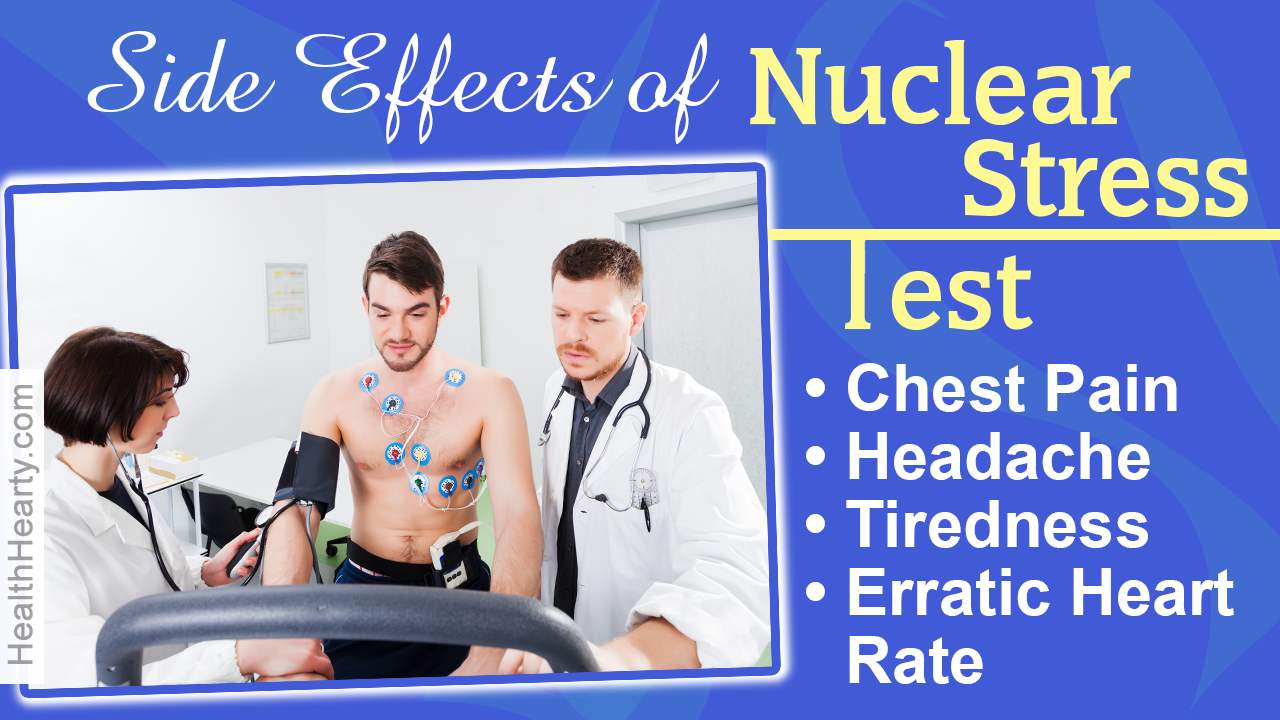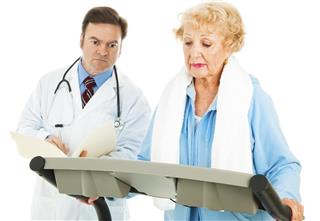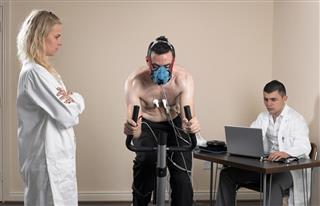
A nuclear stress test provides more reliable and accurate information than the other routine exercise stress tests. However, these tests are accompanied by some side effects. This article will shed some light on the same.
Nuclear stress test (or cardiac stress test) is a diagnostic test that assesses the blood flow to the heart, and is usually performed in patients suspected of suffering from heart diseases, namely coronary artery disease. In this stress test, the patient is connected to an ECG (to measure the heart rate) and is supposed to go through some physical exertion (mostly via exercising on a treadmill) to determine how is the actual blood flow to the heart affected. If the patient is not in a position to exercise, then he is injected with a drug (this is called chemical stress test) that will mimic the effect that physical exertion has on our heart. A radioactive tracer will be injected before and during the test. A special camera called gamma camera is employed that traces the radiation released by a tracer – a radioactive material that is intravenously injected after certain stress is exerted – and captures the images of the heart.
The computer images taken can reveal the size of the heart’s chambers and its ability to pump blood to the various organs of the body. The information about any damaged cell or a dead muscle in the human heart can be found out with the help of the images obtained in these tests. The nuclear stress test results also provide information regarding the blockage of arteries that is beneficial for patients with coronary heart diseases. The images captured illustrate the following: (1) the first few images show how blood flow to the heart takes place; (2) the next set demonstrates the heart’s functioning during exertion. The areas that appear light in the image suggest normal blood blow (indicates healthy heart muscle due to which the tracer gets absorbed) while those that appear dark indicate reduced blood flow (absorption of the radioactive tracer is less in this case due to damaged heart muscle) to the heart.
| The radiation that a patient is subjected to during the stress test is considered safe. Side effects are an extremely rare occurrence, and if a reaction occurs, then it can be due to the pharmacological agents that are tagged to the radioactive tracer. |
Side Effects
It has been found that many people complain of mild to severe headaches. This could happen due to the effect of the vasodilators (the pharmacologic agent used for the stress test). The occurrence of this side effect is considered normal; however, make sure you let your cardiologist know about it.
One of the side effects that the person suffers from is chest pain or a discomfort in the heart, immediately after the nuclear stress test. This happens due to increased pressure or pumping of the blood into the heart due to physical exertion.
Few people may face problems of erratic heart rate and difficulty in breathing after the tests. When the patient is put through some form of physical exertion, it affects the blood flow to the heart, resulting in an erratic heart rate.
Adenosine (given to patients with abnormal heart rhythm), dobutamine (given to asthma patients), etc. – pharmacological agents used during a stress test – are coronary vasodilators that dilate the heart vessels because of which blood flow increases. The side effect of these agents is that it can result in lowering of blood pressure levels in patients.
Few patients have reported to have experienced a metallic taste in their mouths, that is quite bitter and is believed to cause a discomfort to the person. This happens during a treadmill stress test when a patient may experience a bitter taste few minutes after the injection has been administered.
- Perspiration
- Tiredness
- Nausea
- Headache
- Flushing
- Breathlessness
Note.- It is to be noted that every individual responds differently to the nuclear stress tests and so some people can show no side effects after the nuclear stress tests, whereas some can experience side effects in varying intensities.
Following are the important points that must be followed before the nuclear stress test.
- The person going for the nuclear test is expected not to eat or drink 4 to 6 hours before the test.
- Your doctor will ask you to stop taking medicines (if you are taking any) temporarily, so that the effectiveness of nuclear stress test is more pronounced.
- You will be asked to wear comfortable clothes, as you have to run on a treadmill.
The gains from the stress test are far more than the risks, and there are trained technicians to handle radiation exposure. The costs are very expensive (relative to other tests). These tests have rarely caused deaths or some serious trouble. However, if you experience any adverse effect, you should not panic and must immediately consult a doctor. The side effects are occasional and go away with time. Pregnant women and other people who are unwell, must consult the doctor before they opt for this test.
Disclaimer: This HealthHearty article is for informative purposes only, and should not be used as a replacement for expert medical advice.





